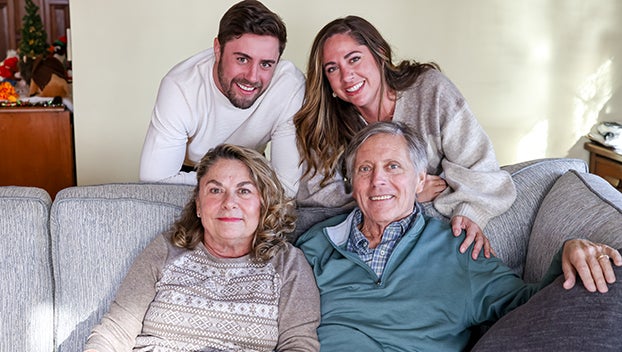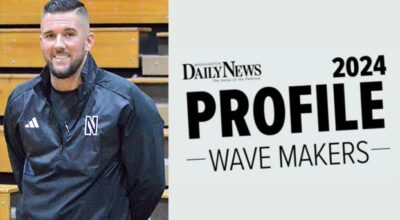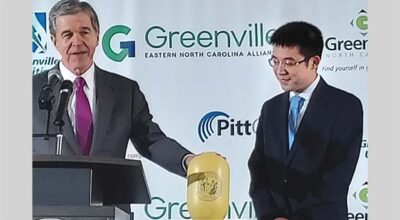Remembering Larry Smithwick: Living and enjoying life to the fullest
Published 3:17 pm Tuesday, March 5, 2024

- From left to right: Back row, Coleman Smithwick, Shelby Smithwick. Front Row, Sue and Larry Smithwick. Photo courtesy of the Smithwick family.
|
Getting your Trinity Audio player ready...
|
Larry Franks Smithwick, beloved son of Washington and co-founder of Park Boat Company, was the “most famous, non-famous person” to live in Beaufort County. People either knew him, knew of him or knew a story or two about him.
A reputation like that doesn’t come from standing in the shadows. It is the reward (sometimes consequence) of having a vivacious, captivating personality that enthralls us. It is this kind of charismatic personality that attracts many of us, because it belongs to someone who isn’t afraid to live life to the fullest. People like Smithwick are who we want to be like, because they are free spirits appearing not to be bogged down by the constraints of everyday life.
“He always taught people to enjoy life – to take it as it was; as it came. Don’t run from it, and do the best you can with it,” Sue, Smithwick’s wife, said. They were married for 33 years.
Smithwick spent his 71 years of life loving, mentoring and entertaining everyone he encountered. He died on Feb. 22 surrounded by loved ones.
In the wake of his legacy are countless memories people have of his intrepid, spontaneous nature.
“He and his wife Sue were going on a vacation to the island of Grenada. On the plane, they bumped into this guy in a military uniform and started talking to him. He turns out to be the prime minister’s son. Before it’s all over with, he’s inviting them to dinner at the prime minister’s house, and they’re going to have dinner with the prime minister and he’s going to give them a private tour of the island,” Terry, Smithwick’s older brother, shared. Terry and Smithwick worked together at Park Boat Company for more than 40 years.
“His ability to make friends was probably his greatest talent. He could have never seen you before and in three or four minutes it was like you guys would be best friends. He had you captivated,” Terry said.
It didn’t matter if someone was a prime minister’s son or a boat washer at Park Boat Company, they were going to receive an equal amount of respect and dignity from Smithwick. He treated everyone with kindness. “He recognized the value everyone contributed,” Austin, Smithwick’s nephew, said.
At home, Smithwick was no different. His children had a fun-loving father who always attended their games and encouraged them to do their best, but not take life so seriously.
For Coleman, his father’s legacy teaches him that if you work hard, you can play hard and take time to be with your family.
“Working hard so that he could make those sacrifices like taking off time to go on vacation or seeing our stuff. Looking back now, that’s the small things that when you’re growing up you don’t really realize how important that is – having that parent there,” Coleman said.
For three years, Smithwick had his children, Coleman and Shelby, convinced that tubing was an Olympic sport. “He’d get us on there, and we thought we were training,” Coleman said. His sister, Shelby, added that they wore mouthguards while tubing. This is one of Coleman’s favorite memories of his father.
Shelby said Smithwick was a “great” father who was also her “best friend” as she got older. He was always there for his children, supporting them in their endeavors. She shared that every day her father would send her a quote of the day that would encourage or inspire her. They also talked every day about everything and nothing – just to hear each other’s voice and know how the other person’s day went.
“He was inspirational; just a good person. There was no question, ‘did he love me’ or anything like that. I knew how loved I was by him and he made that known,’” Shelby said. “We’d talk every single morning. Every single morning I’d have probably a 20 to 30 minute conversation with him about things. He was my best friend. When you’re younger they’re your parent, but when you get older they’re your person. They’re who you look for business advice, relationship advice, financial advice and he was just there.”
As an uncle, Smithwick was the “coolest one you could ever have,” Austin said. “He taught you things you should know, and he taught you a few things you shouldn’t know.”
As Terry, Sue, Coleman, Shelby and Austin shared memories of Smithwick, there was a lot of laughter and smiles. Through their grief, they are finding joy and comfort in the interactions and experiences they shared with Smithwick. Also, they are comforted by the stories people shared with them of interactions they had with Smithwick. Many of these stories were unknown to the family until Smithwick’s funeral.
At Smithwick’s funeral, there were many people whom Shelby had never met – people from Smithwick’s graduating class at Washington High School and his fellow classmates from UNC-Chapel Hill. “He had that impact, and it was a really beautiful moment to see how many people were in the room that he impacted their lives. Enough for them to take a Wednesday off to come out and be there for him,” she said.
Sue shared a story of Smithwick’s helpfulness and generosity to his community. Chris Avery, camp manager of Roanoke Christian Camp told Sue that Smithwick would chat with him often and volunteer around the camp. Smithwick would pick up trash, complete maintenance repair projects. “I kept telling Chris, I need to pay you some money for this,” Sue said. “and Chris goes, ‘well, if I really calculated it, everything Mr. Larry did for me – I would owe y’all money.’”
“That was one of many people that were there with stories of how he talked to them and created a relationship with them and cared for them and he would always do that,” Sue said.
Smithwick’s life began to slow down in 2017 when he was diagnosed with colon rectal cancer. Smithwick was given less than three years to live; however, he defied doctors’ predictions and lived seven-and-a-half. After his diagnosis, Sue said he never wanted to play “the cancer card” as a reason why he couldn’t do something or be somewhere. He did his best to fulfill promises he made to his friends and family. He would not let cancer define him.
“You would never have known, and he did not want you talking about his cancer. If he didn’t feel good, I’d tell him, ‘well, Larry just tell them you can’t make it, because you don’t feel good and you have cancer,’ and he went, ‘no, I’m not doing that,’” Sue said.
“One thing people should know is they definitely should go get a colonoscopy to make sure that they don’t go through that if they can avoid it,” Sue said.





